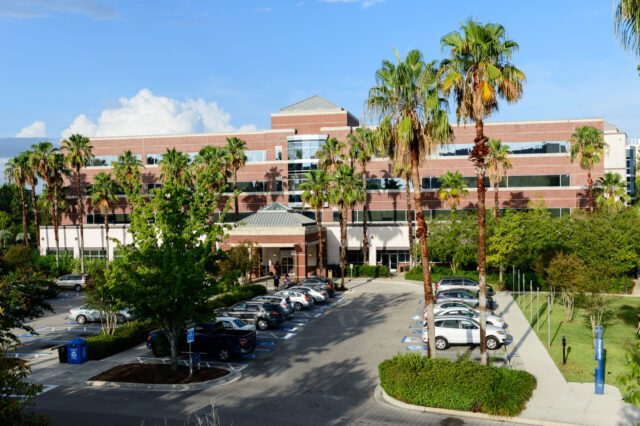UF Health Shands Hospital was designated as a high-performing hospital for diabetes and endocrinology by US News & World Report.

Update your location to show providers, locations, and services closest to you.

The UF Nontuberculous Mycobacterial Disease Program is a multidisciplinary group of clinicians and scientists seeking a better scientific understanding of disease caused by nontuberculous mycobacteria (NTM) in order to provide better clinical diagnoses and management.
NTM are environmental bacteria that are related to the more virulent pathogens that cause tuberculosis and leprosy. NTM are considered opportunistic pathogens, i.e., they usually only cause disease in persons who are immunocompromised or otherwise susceptible. These include patients who are immunocompromised by cancers, HIV infection, immunosuppressive medical treatments (e.g., TNF-alpha inhibitors used to treat rheumatoid arthritis, Crohn’s disease and other conditions), as well as patients who have underlying lung disease, including but not limited to chronic obstructive pulmonary disease (COPD) and bronchiectasis (associated with cystic fibrosis or other conditions). However, the largest group of patients now appears to be middle-aged and elderly women who are underweight and who have no known recognizied immunosuppression or lung disease.
UF Health Shands Hospital was designated as a high-performing hospital for diabetes and endocrinology by US News & World Report.

UF Health Shands Hospital is ranked as one of the nation's top hospitals for pulmonology and lung surgery by U.S. News & World Report.

Approximately 85% of NTM disease occurs in the lung, but NTM can cause infections of skin, lymph nodes and virtually any organ.
The diagnosis of NTM disease relies on demonstrating the NTM bacteria in sputum or other respiratory secretions or bodily fluids. As NTM are common in the environment and may occasionally ‘colonize’ the lung, i.e., be present but not cause infection, it is recommended that at least two sputa specimens confirm the presence of the same NTM species in a patient with signs and symptoms of the disease. Sometimes bronchoscopy procedures are necessary to collect respiratory secretions in patients who cannot produce sputa specimens. Usually the diagnostic evaluation also includes a search for associated conditions, such as cystic fibrosis, alpha-1-antitrypsin deficiency, gastroesophageal reflux disease, chronic aspiration, and others.
Physical therapy, occupational therapy and massage therapy services for patients experiencing problems associated with surgery or due to side effects of chemotherapy or radiation treatment.
UF Health offers day-of, on-site imaging services in a qualified medical center.
UF Health Specialty Pharmacy focuses on medication therapy for patients with complex disease states. Medications in our specialty pharmacy range from oral to cutting-edge injectable and biologic products.
Full-service, on-site lab services and testing for your convenience.
Accepts most prescription plans; competitive prices; on-site.
UF Health has an adaptive seating clinic where our therapists evaluate patients for both adaptive equipment and mobility device needs.
Aids and services are available to help people with disabilities communicate effectively.
Many of UF Health's properties have various branch ATMs and/or branch offices.
Baby-changing stations are available in many of UF Health's restrooms.
Options include Opus Coffee and Starbucks in the hospital atriums.
Patients and guests get free wireless internet access at UF Health hospitals.
The Garden of Hope, Sun Terrace, and other spaces help patients and families relax.
Gender-neutral, public restrooms are located throughout UF Health's properties.
The Gift Stops offer a wide variety of gifts and products for patients and families.
UF Health provides free language services to people whose primary language is not English.
You can download a form or call (352) 594-0909 to have medical records mailed or faxed.
Notary services are available to patients and visitors Monday through Friday 8 a.m. to 5 p.m.
Smoking, chewing tobacco, or using electronic cigarettes is prohibited on UF Health properties.
Social workers are part of the patient's care team and work with medical staff and nurses.